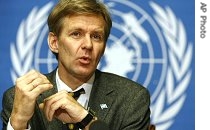-
(单词翻译:双击或拖选)
By Lisa Schlein
Geneva
29 November 2006
U.N. Undersecretary-General for Humanitarian1 Affairs Jan Egeland says the international community, governments and political leaders are in denial about the scope of the humanitarian crisis in Sudan's province of Darfur. But, the U.N. humanitarian chief says it is not too late to take action. Lisa Schlein reports for VOA on Egeland's final news conference in Geneva before stepping down from his post on December 13.
---
U.N. Undersecretary-General Jan Egeland says the international community could have stopped the war in Darfur in early 2004 when there was a ceasefire. But, he says the world woke up too late to the humanitarian catastrophe2 that was unfolding.

Jan Egeland speaks during press conference at UN European headquarters in Geneva, 29 Nov 2006
He says everyone failed the people of Darfur, thousands of whom have been victims of massive killings3, rapes4 and other atrocities5. He accuses African countries of having done too little too late. He says the Arab countries, the major ASEAN economic partners, the Western countries, all have done too little, too late.
"If there had been enough pressure earlier on the government and the rebels, we would not have had the situation in Darfur we have today," he said. "It is not too late. It is not too late. We can still have, we should still have an international force, which is much better. It should be African-led. It should be African-driven. It should be African in its nature. It should be African in its face. The U.N. has to become part of it for it to become effective. That is the lesson of these three and one half long years."
Egeland says there is ample evidence that the situation is getting worse. He warns the conflicts in Darfur, Chad and Central African Republic are intimately linked. He says there is real danger of a regional conflict.
"In all of the three countries, there are fighters from the other countries crossing the border, seeking refuge on each others' sides," he said. "Countries in the region are aiding the rebels on the other side. This is one of Africa's biggest diseases. I mean the enemy of my enemy is my friend. That is a fallacy really. What you are creating is long-term chaos6 for yourself and a lot of suffering for your own citizens and for your neighbors."
On another subject, Egeland says the situation in Iraq is becoming worse. He calls the death of more than 100 civilians7 every day an outrage8. He notes this is three times bigger than the number of people that were killed on a daily basis during Lebanon's civil war.
He says this situation cannot continue. He says everyone, those who invaded Iraq, the neighboring countries, political leaders, everyone has to do something radical9 to change this situation.
 收听单词发音
收听单词发音
1
humanitarian

|
|
| n.人道主义者,博爱者,基督凡人论者 | |
参考例句: |
|
|
|
2
catastrophe

|
|
| n.大灾难,大祸 | |
参考例句: |
|
|
|
3
killings

|
|
| 谋杀( killing的名词复数 ); 突然发大财,暴发 | |
参考例句: |
|
|
|
4
rapes

|
|
| n.芸苔( rape的名词复数 );强奸罪;强奸案;肆意损坏v.以暴力夺取,强夺( rape的第三人称单数 );强奸 | |
参考例句: |
|
|
|
5
atrocities

|
|
| n.邪恶,暴行( atrocity的名词复数 );滔天大罪 | |
参考例句: |
|
|
|
6
chaos

|
|
| n.混乱,无秩序 | |
参考例句: |
|
|
|
7
civilians

|
|
| 平民,百姓( civilian的名词复数 ); 老百姓 | |
参考例句: |
|
|
|
8
outrage

|
|
| n.暴行,侮辱,愤怒;vt.凌辱,激怒 | |
参考例句: |
|
|
|
9
radical

|
|
| n.激进份子,原子团,根号;adj.根本的,激进的,彻底的 | |
参考例句: |
|
|
|















